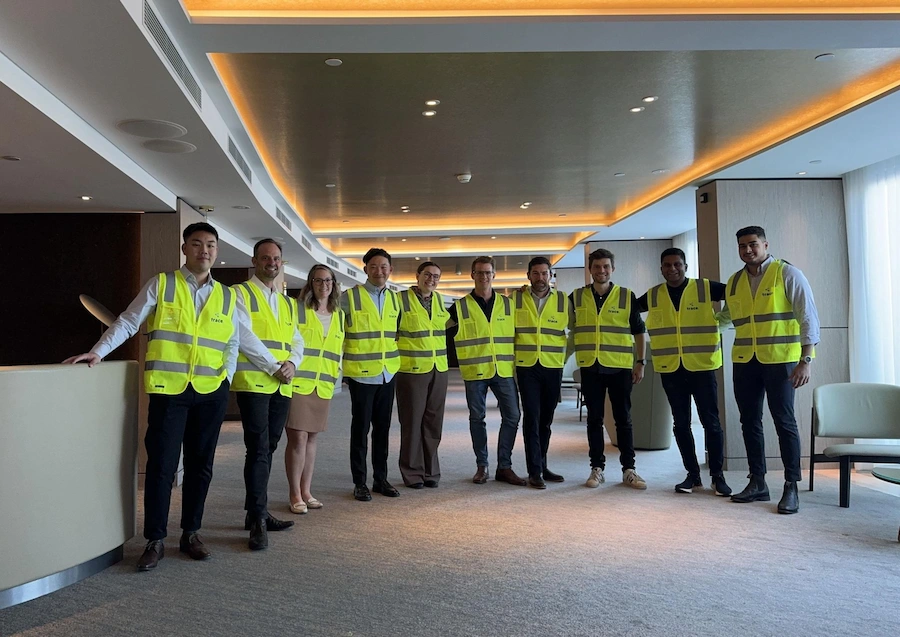Ready to turn insight into action?
We help organisations transform ideas into measurable results with strategies that work in the real world. Let’s talk about how we can solve your most complex supply chain challenges.

Emergency response agencies are on the front line during crises, whether responding to natural disasters, health emergencies, or large-scale accidents. To safeguard communities, these agencies must maintain a high level of preparedness and operational capability to respond effectively. One sector with a wealth of experience in optimising supply chains is defence. The defence sector is renowned for its rigorous, efficient, and highly responsive supply chain operations, providing valuable lessons that can significantly enhance the preparedness of emergency response agencies.
By adopting strategies and practices from defence supply chains, emergency agencies can optimise operations, improve response times, and enhance their overall readiness. This article explores key areas where lessons from defence can be applied, including warehouse network optimisation, facility design, automation, advanced planning systems, inventory management, transport planning, workforce planning, KPI frameworks, organisational design, and scenario modelling. We will also discuss how Trace Consultants, with its extensive experience working with the Australian Defence Forces, Victoria Police, and various health departments, can help emergency response agencies implement these strategies to achieve greater preparedness and efficiency.
Warehouse Network Footprint Optimisation
A robust and strategically positioned warehouse network is essential for rapid response during emergencies. In defence, the placement of warehouses is carefully planned to minimise response times and maximise efficiency. Emergency response agencies can adopt similar strategies by analysing their current warehouse locations and determining if they are positioned optimally to support rapid deployment of supplies.
For instance, agencies dealing with natural disasters could benefit from positioning warehouses near high-risk areas. In Australia, this might mean locating warehouses in regions prone to bushfires, floods, or cyclones. Proximity to these areas ensures that critical resources such as medical supplies, equipment, and food can be dispatched quickly when disasters strike.
How Trace Consultants Can Help: Trace Consultants has a deep understanding of supply chain optimisation, having worked with organisations like the Australian Defence Forces and Victoria Police. We can assist emergency agencies in conducting a thorough analysis of their current warehouse networks and provide data-driven recommendations for optimising locations to reduce response times.
Warehouse and Distribution Facility Design
The design of warehouse and distribution facilities has a direct impact on the efficiency of supply chain operations. Defence supply chains utilise cutting-edge facility designs that maximise space, streamline workflows, and enhance security. Emergency response agencies can incorporate these design principles to improve their own facilities, creating more efficient and resilient spaces.
Key design elements include:
- Optimised Layouts: Designing warehouse layouts to reduce movement, minimise handling time, and increase efficiency.
- Advanced Storage Solutions: Using high-density shelving and automated storage systems to maximise space.
- Security Measures: Implementing robust security protocols to protect critical supplies.
- Environmental Controls: Incorporating climate controls to safeguard sensitive materials and equipment.
How Trace Consultants Can Help: Trace Consultants has extensive experience working with organisations such as QLD Health and NSW Health, designing warehouses that are both efficient and future-proofed. We can help emergency agencies improve their facility designs, ensuring they are well-equipped to handle high-pressure situations and minimise delays in dispatching critical supplies.
Automation in Supply Chain Operations
Automation is a critical component of modern defence supply chains, providing speed, accuracy, and efficiency. Emergency response agencies can reap significant benefits by integrating automation into their supply chain processes.
Areas where automation can make a substantial difference include:
- Inventory Management: Automated systems track supplies in real-time, ensuring critical items are replenished as needed and reducing the risk of shortages.
- Order Fulfilment: Automated systems for picking and packing can accelerate the deployment of emergency supplies.
- Data Analysis: Automated data analytics provide insights into supply chain performance, identifying areas for improvement and forecasting future demand.
How Trace Consultants Can Help: With our experience working with organisations such as the Australian Submarine Agency and the Department of Health, Trace Consultants understands the complexities of automation in supply chains. We can help emergency agencies implement cutting-edge technologies that enhance the accuracy and speed of their operations, ensuring that they are ready to respond to any crisis.
Advanced Planning Systems for Improved Forecasting
Defence supply chains rely on advanced planning systems to forecast demand, allocate resources, and plan for various scenarios. Emergency response agencies can adopt these systems to improve their own planning processes, ensuring that they are prepared for any eventuality.
Key components of advanced planning systems include:
- Demand Forecasting: Using historical data and predictive analytics to anticipate the need for supplies during different types of emergencies.
- Resource Allocation: Optimising the allocation of resources, including personnel and equipment, based on forecasted demand.
- Scenario Planning: Developing and testing multiple response scenarios to ensure preparedness for a wide range of potential emergencies.
How Trace Consultants Can Help: Trace has successfully implemented advanced planning systems for several government agencies, including the Department of Prime Minister & Cabinet. We can assist emergency agencies in developing sophisticated planning frameworks that improve their ability to anticipate and meet the needs of communities during crises.
Inventory Management and Optimisation
Effective inventory management is crucial for emergency response agencies to ensure that supplies are available when needed without tying up excessive resources in stock. Defence supply chains are experts at maintaining just-in-time inventory and optimising inventory levels to reduce waste and costs.
Strategies for optimising inventory management include:
- Just-In-Time Inventory: Minimising excess inventory by replenishing supplies only as needed.
- ABC Analysis: Categorising inventory based on usage frequency and criticality to prioritise management of the most important items.
- Real-Time Tracking: Implementing systems to monitor stock levels and ensure the availability of essential supplies.
How Trace Consultants Can Help: Trace has helped optimise inventory management systems for health departments across Australia, such as QLD Health and NSW Health. We can assist emergency response agencies in adopting inventory optimisation strategies that reduce costs, minimise waste, and ensure supplies are always available when needed.
Transport Planning for Timely Response
Efficient transport planning is key to the rapid delivery of supplies during emergencies. Defence supply chains excel in transport planning, using sophisticated systems to optimise routes, manage fleets, and coordinate logistics. Emergency response agencies can adopt similar strategies to improve their transport operations.
Key elements include:
- Route Optimisation: Using advanced software to identify the fastest and most efficient delivery routes.
- Fleet Management: Implementing systems to monitor vehicle availability, maintenance, and usage.
- Communication and Coordination: Establishing clear protocols to ensure smooth and synchronised transport operations.
How Trace Consultants Can Help: With our extensive experience working with logistics and transport planning in both the public and private sectors, Trace Consultants can help emergency agencies enhance their transport planning capabilities, ensuring that critical supplies are delivered efficiently and on time.
Workforce Planning for Emergency Response
A well-prepared workforce is vital for emergency response agencies. Defence organisations place significant emphasis on workforce planning to ensure personnel are trained, available, and equipped to handle a variety of scenarios. Emergency response agencies can adopt similar practices to ensure their teams are always ready to act.
Key components of workforce planning include:
- Training Programs: Ensuring that staff are trained to handle different types of emergencies.
- Adequate Staffing Levels: Maintaining sufficient staffing levels to meet the demands of large-scale crises.
- Role Clarity: Clearly defining responsibilities to ensure smooth operations during high-pressure situations.
How Trace Consultants Can Help: Having worked with large-scale organisations such as the Australian Defence Forces and Victoria Police, Trace Consultants has deep expertise in workforce planning. We can assist emergency response agencies in building a capable, well-trained workforce, ready to meet the challenges of any emergency.
KPI Frameworks and Organisational Design
Effective organisational design and the use of key performance indicators (KPIs) are critical to maintaining an efficient supply chain. Defence supply chains use well-defined KPIs to measure performance and drive continuous improvement. Emergency response agencies can adopt similar frameworks to monitor and enhance their operations.
How Trace Consultants Can Help: Trace Consultants has worked with various government bodies, helping them establish KPI frameworks and organisational designs that promote efficiency and accountability. We can help emergency response agencies develop performance metrics and structures that foster agility, collaboration, and continuous improvement.
Scenario Modelling and Planning for Enhanced Preparedness
Scenario modelling and planning allow organisations to anticipate and prepare for a wide range of potential emergencies. Defence supply chains use sophisticated modelling tools to simulate various scenarios and develop effective response plans. Emergency response agencies can adopt these practices to improve their preparedness for crises.
How Trace Consultants Can Help: Trace has extensive experience in scenario planning and risk assessment, working with both government and defence clients. We can help emergency agencies incorporate scenario modelling tools that enable them to anticipate risks, plan responses, and ensure they are fully prepared to handle any emergency.
Emergency response agencies play a critical role in safeguarding communities during crises, and improving their preparedness is essential. By adopting supply chain strategies from the defence sector, agencies can enhance their capabilities and ensure that they are always ready to respond. From warehouse optimisation to automation and workforce planning, these practices offer valuable lessons in building more efficient, resilient, and responsive operations.
How Trace Consultants Can Help: Trace Consultants, with its extensive experience working with the Australian Defence Forces, Victoria Police, QLD Health, and other key government agencies, is uniquely positioned to help emergency response agencies improve their supply chain operations. Our expertise in supply chain optimisation, advanced planning systems, inventory management, and transport logistics ensures that emergency agencies are equipped to protect and serve their communities effectively. Contact us today to learn how we can assist you in enhancing your preparedness and operational readiness.
Contact us today, trace. your supply chain and procurement consulting partner.
Ready to turn insight into action?
We help organisations transform ideas into measurable results with strategies that work in the real world. Let’s talk about how we can solve your most complex supply chain challenges.









